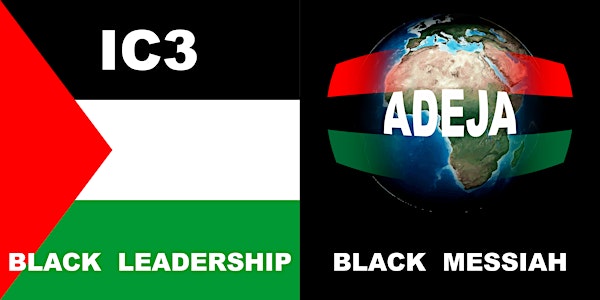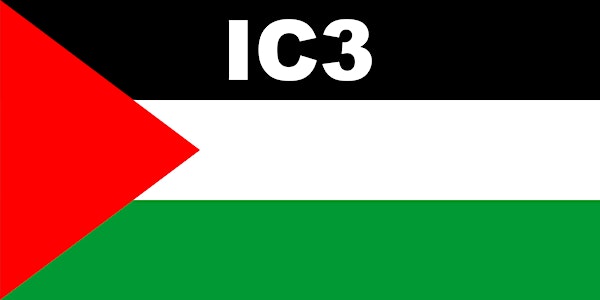





BLACK LEADERSHIP, THE BLACK MESSIAH AND BREAKING THE CURSE OF HAM
Discuss reparations for the Arab enslavement of Black Africans
Location
Reparation Corner, 41 - 47 West Green Rd, Tottenham, Haringey. N15
41 West Green Road London N15 5BY United KingdomAbout this event
Black Leadership, The Black Messiah - Breaking the Curse of Ham
I. Introduction
In the complex landscape of identity, justice, and empowerment, the African Diaspora Equity and Justice Alliance (ADEJA) emerges as a transformative initiative with a dedicated focus on reparatory justice and empowerment for the IC3 Black community. This document aims to delve into the key components of ADEJA, its mission, the Curse of Ham, Black leadership, the concept of the Black Messiah, the historical Zanj Rebellion, and ADEJA's engagement in serving reparatory justice in the Arab world.
II. ADEJA: African Diaspora Equity and Justice Alliance
A. Mission and Vision
ADEJA, short for the African Diaspora Equity and Justice Alliance, is an initiative conceived and established by Reparation Nation Limited, headquartered in London. Unlike conventional initiatives that seek funding or partnership, ADEJA seeks the endorsement of its transformative vision. The core mission revolves around creating a Black African Autonomous Entity for Empowerment and Reparatory Justice, emphasizing holistic betterment and independence without external financial dependency.
B. Charter Overview
- Name and Mission (Article I): ADEJA's mission is to advance the well-being, empowerment, unity, and the pursuit of historical reparatory justice for Black Africans, the Black African diaspora, and the Mixed-Black diaspora, based on an evidence-based claim-by-claim basis.
- Definitions and Classifications (Article II): ADEJA recognizes the UK Government's race and ethnicity standards, specifically focusing on IC3 Black individuals, and uses British Police IC codes for classification.
- Alignment with the UK Government (Article III): ADEJA positions itself as an ally of the UK government, sharing common purpose and recognizing the value of race and ethnicity codes for good government.
- Reparation Assets (Article IV): Reparations are categorized into tradeable and non-tradeable assets, emphasizing financial resources and cultural preservation.
- Member Entities (Article V): A clearinghouse for entities identifying as IC3 Black or part IC3 Black, encouraging contributions to ADEJA's mission.
- Evidence-Based Reparation Claims (Article VI): Reparatory justice processed on a claim-by-claim basis, offering rewards for evidence through collaboration with the White People Protection League.
- Reparation Shares (Article VII): ADEJA establishes Blackness as an asset class, allocating shares based on the percentage of Black heritage.
- Identity Recognition (Article VIII): Recognizing aspects of identity, including place of birth, lineage, appearance, state of mind/habits, and DNA.
- Social Credit (Article IX): Implementation of a comprehensive social credit system to incentivize actions contributing to Black Betterment.
- Conclusion (Article X): ADEJA aims to establish a transformative platform addressing historical inequities, fostering international collaboration, and seeking reparatory justice by 9 November 2025.
III. The Curse of Ham
The Curse of Ham is a biblical narrative found in the Book of Genesis (Genesis 9:20–27). It recounts an incident where Noah, after surviving the flood, became drunk and exposed himself in his tent. Ham, Noah's son, saw his father's nakedness and informed his brothers. In response, Noah cursed Ham's son, Canaan, to be a servant of servants.
Historically, this narrative has been misused to justify racial slavery and discrimination, particularly against Black populations. The misinterpretation of this biblical story has perpetuated harmful stereotypes and contributed to the justification of slavery and racism. It is essential to recognize and challenge such misinterpretations to promote understanding, justice, and equality.
IV. Black Leadership
A. Historical Context
Black leadership has played a pivotal role throughout history, contributing to the fight against oppression, advocating for civil rights, and striving for the empowerment of Black communities. From figures like Martin Luther King Jr. and Malcolm X to contemporary leaders, the narrative of Black leadership reflects a commitment to justice, equality, and social progress.
B. ADEJA's Approach to Black Leadership
ADEJA, recognizing the importance of leadership in effecting positive change, hosts weekly Black leadership meetings and discussions at "Reparation Corner" in Tottenham, London. This platform serves as a space for dialogue, collaboration, and strategizing on issues pertinent to the IC3 Black community. By fostering an environment for leadership development, ADEJA aims to empower individuals to take an active role in shaping their communities and advocating for reparatory justice.
V. The Black Messiah
A. Historical and Cultural Significance
The concept of the Black Messiah holds historical and cultural significance, often intertwined with liberation movements and the quest for justice. It symbolizes a transformative figure, someone who leads the community towards empowerment, freedom, and justice. This archetype resonates deeply within the Black diaspora's collective consciousness, representing hope and the potential for positive change.
B. ADEJA's Perspective
ADEJA, in aligning with the mission of creating a Black African Autonomous Entity for Empowerment and Reparatory Justice, acknowledges the importance of fostering leadership that embodies the spirit of the Black Messiah. Through its initiatives, ADEJA aims to cultivate a new generation of leaders committed to the betterment of the IC3 Black community and the pursuit of reparatory justice.
VI. The Zanj Rebellion
The Zanj Rebellion, occurring from 869 to 883 AD, was a major uprising against the Abbasid Caliphate in the region of Basra (modern-day Iraq). Primarily led by African slaves, the rebellion sought to challenge oppressive conditions and achieve freedom. The Zanj Rebellion serves as a historical testament to the resilience and determination of enslaved Africans in their quest for justice and autonomy.
VII. ADEJA's Pan Arab Colors for Reparatory Justice
ADEJA, in a symbolic gesture, has adapted the Pan Arab colors for a flag dedicated to serving reparatory justice to Black and Mixed-Black people in the Arab world. This adaptation reflects a commitment to inclusivity and acknowledges the specific challenges faced by Black communities in the Arab world, fostering a sense of unity and shared struggle.
VIII. Weekly Black Leadership Meetings at Reparations Corner
ADEJA actively engages with the community through weekly Black leadership meetings and discussions at Reparations Corner in Tottenham, London. This physical space serves as a hub for dialogue, collaboration, and the exchange of ideas related to reparations for Black and Mixed-Black people in the Arab world. These meetings aim to involve the public in shaping the agenda for reparatory justice and fostering a sense of collective responsibility.
IX. Conclusion
In conclusion, ADEJA stands as a pioneering initiative dedicated to empowering and seeking reparatory justice for the IC3 Black community. Through its comprehensive charter, commitment to evidence-based claims, and the implementation of a social credit system, ADEJA aims to address historical inequities, foster international collaboration, and create a transformative platform for the betterment of Black Africans and the diaspora. The engagement in weekly Black leadership meetings and discussions at Reparations Corner underscores ADEJA's commitment to community involvement and the pursuit of justice.
As ADEJA moves forward with its mission, it seeks to break the historical narratives of oppression, challenge misinterpretations like the Curse of Ham, and foster a new era of leadership and empowerment symbolized by the concept of the Black